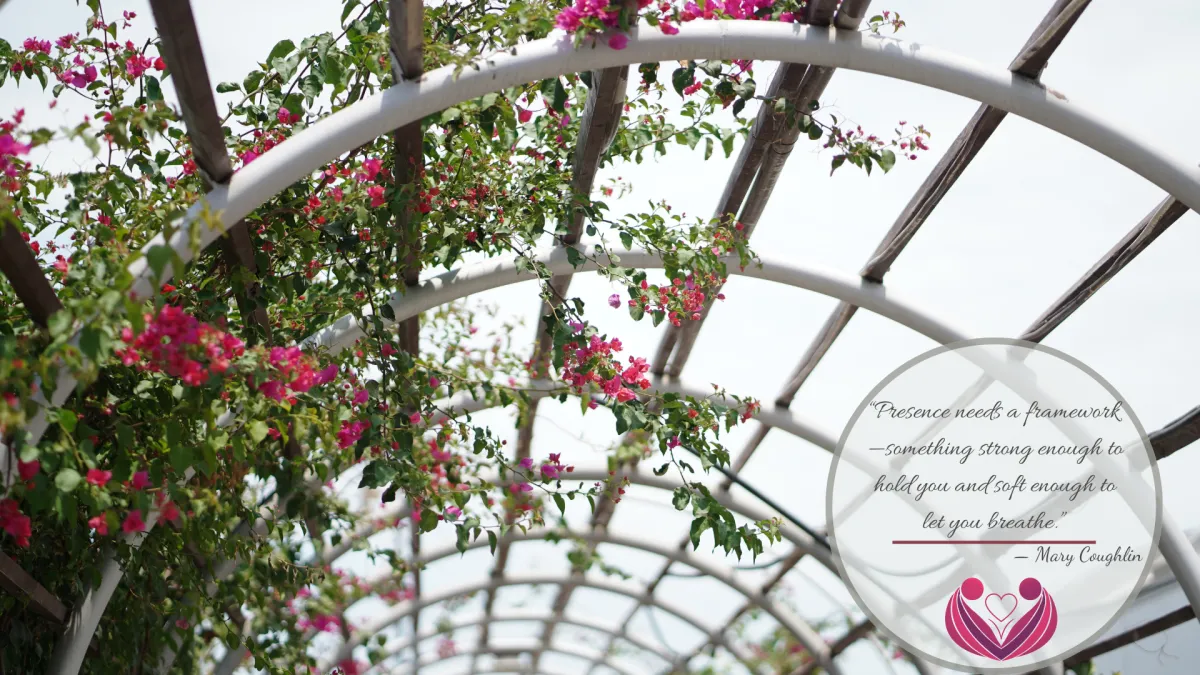
Frameworks That Hold Us
“Presence needs a framework—something strong enough to hold you and soft enough to let you breathe.” - Mary Coughlin
Frameworks That Hold Us
Caring Science: Structure That Feeds the Soul
BUFFER: The Second F is for Frameworks
Presence is powerful. But let’s be honest—it's hard to sustain when the systems we work in constantly pull us away from ourselves.
Whether it’s the alarms in the NICU, the weight of documentation, or the mental load of navigating broken civic structures, we can’t just “will” ourselves into presence. We need scaffolding. Structure. Something to hold us while we hold others.
This is the paradox we rarely name in healthcare and public life:
We expect people to show up with heart, soul, and compassion—but we give them frameworks that burn them out, wear them down, and box them in.
Presence Needs a Container
In Trauma-Informed Developmental Care (TIDC), frameworks aren't just policies—they're promises. They protect space for human connection. They center safety, voice, and empowerment. They give us permission to pause and tools to return to presence when we've been pulled too far from it.
For example:
When we integrate Protected Sleep as a core measure, we’re not just helping babies regulate—we’re honoring their rhythms and protecting their developing brains.
When we nurture Compassionate Collaborative Relationships, we’re not just promoting teamwork—we’re modeling what it means to be in mutual, trauma-informed presence.
These aren’t just checkboxes. They’re invitations back to our essence.
Caring Science: Structure That Feeds the Soul
Jean Watson reminds us that sacred systems are necessary. That love, while boundless, still needs form. Rituals. Rhythms. Shared meaning.
Presence isn’t just about slowing down—it’s about being held by something deeper than your to-do list.
This is the kind of framework that doesn’t restrict you.
It reminds you.
BUFFER: The Second F is for Frameworks
In the BUFFER framework, Frameworks are what allow healing to be consistent, not accidental.
A trauma-informed framework is like a trellis—it helps the vine of presence grow toward the light.
BUFFER calls us to create inner frameworks (boundaries, values, beliefs) and outer ones (policies, protocols, cultural norms) that align with healing—not just surviving.
Frameworks that honor dignity.
Frameworks that foster curiosity.
Frameworks that give us the courage to say, “This isn’t working—and here’s how we can do better.”
The Bigger Picture
What if the frameworks that hold our NICUs could also shape our neighborhoods?
What if the policies that govern our care also reflected our care values?
This is the work of trauma-informed systems—not just in hospitals, but in governments, communities, and cultures.
Frameworks that hold presence are blueprints for a new world.
A Reflection to Carry With You
This week, ask yourself:
💭 What frameworks are supporting your presence right now?
💭 Which ones are getting in the way?
You don’t have to dismantle everything. Just name it. Noticing is the beginning of liberation.
With presence and purpose,
Mary
P.S.: An Invitation to Go Deeper
If this reflection speaks to you, I hope you’ll join me for my upcoming virtual workshop:
🌀 The Presence: Reclaiming the Healing Moment in a Fractured World
🗓️ Friday, June 6 | ⏰ 11am–3pm ET | 🎓 4 CE credits
💻 Live, soulfully structured, and designed to hold space for your healing, too.
Together, we’ll explore how to build frameworks that sustain presence in practice—and how to return to wholeness in the systems that need us most.
